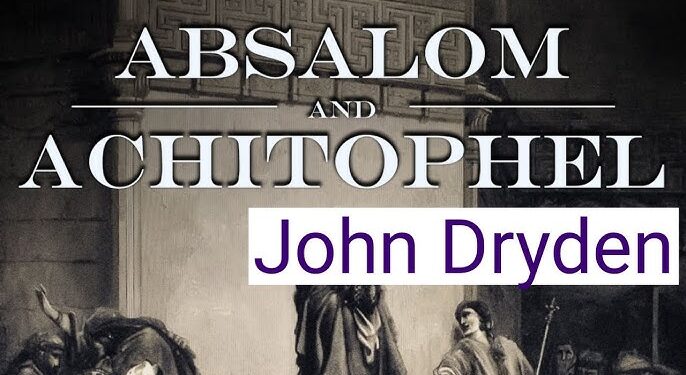Table of Contents
ToggleIntroduction
Absalom And Achitophel Summary By John Dryden John Dryden’s Absalom and Achitophel, first published in 1681, is one of the most significant political poems of the Restoration period. Written during a time of intense political and religious conflict in England, the poem is a satirical allegory that reflects the turbulent politics of the time, particularly the controversy surrounding the Catholic Duke of Monmouth’s claim to the throne. Through the use of biblical allegory and classical allusions, Dryden critiques the political landscape and, by extension, the personalities and events that shaped it.Absalom And Achitophel Summary By John Dryden
The poem is a direct response to the growing political instability during the reign of Charles II. It centers on the rebellion led by Absalom (the illegitimate son of King David, here standing in for Charles II) and his counselor Achitophel (representing the Earl of Shaftesbury, an English politician who opposed the king). Dryden uses these biblical figures as stand-ins for real-life political figures, blending biblical history with contemporary political commentary in a way that was both satirical and didactic.
Absalom and Achitophel serves both as a literary work and a political commentary, offering readers an exploration of ambition, power, betrayal, and the complexities of governance. In this summary, we will break down the poem’s plot, explore its themes, and provide answers to frequently asked questions to better understand Dryden’s intentions, the historical context, and the lasting significance of the poem.
Plot Summary
The Biblical Allegory
The poem is structured as an allegorical narrative in which the biblical story of King David, his son Absalom, and the counselor Ahitophel is reimagined to reflect contemporary political struggles in England. Dryden takes the biblical figures—King David, Absalom, and Ahitophel—and assigns them real-life counterparts: Charles II, his illegitimate son, the Duke of Monmouth, and the politician Anthony Ashley Cooper, Earl of Shaftesbury.Absalom And Achitophel Summary By John Dryden
Read more
The poem begins with a description of the “court of David,” which is a metaphor for the court of King Charles II. David represents the king, who has ruled England for many years. Absalom, his rebellious son, symbolizes the Duke of Monmouth, who had been an illegitimate child of Charles II. In the poem, Absalom seeks to overthrow his father in a bid for the throne, driven by a mix of ambition and political manipulation.
Absalom’s Rebellion
The poem begins with the account of Absalom’s growing dissatisfaction with his father, King David. Absalom’s desire for power leads him to conspire with several influential figures in the kingdom. He gathers support from those who are dissatisfied with King David’s reign, including the disillusioned nobles and the common people who feel neglected by the king. Absalom’s supporters are drawn to his charisma and promise of change, even though his motives are primarily self-serving.
Dryden presents Absalom as an idealistic yet naïve character, driven by ambition rather than a genuine concern for the well-being of the nation. He is depicted as a young man who is manipulated by more experienced advisors, notably Achitophel. This reflects the way that ambitious, younger figures can be used by political manipulators for their own gain, a situation that mirrors the real-life political maneuvering of the time.Absalom And Achitophel Summary By John Dryden

Achitophel’s Machinations
Achitophel, the main antagonist in the poem, serves as Absalom’s mentor and advisor. He is a cunning politician, deeply dissatisfied with King David’s reign and eager to see the throne shifted to someone more sympathetic to his ambitions. Dryden’s portrayal of Achitophel is largely negative, emphasizing his manipulative nature and his lack of moral integrity.Absalom And Achitophel Summary By John Dryden
In the poem, Achitophel presents himself as a man of wisdom and vision. He argues that Absalom, despite being illegitimate, has the right to claim the throne because of his youth, charisma, and the widespread dissatisfaction with David’s rule. Achitophel’s speech persuades Absalom to rebel against his father, despite the fact that the younger man lacks the maturity or moral justification to lead a rebellion.
Through Achitophel, Dryden critiques those who use the language of reform to mask their true ambitions. Achitophel’s machinations and manipulation of Absalom reflect the political tactics of the time, particularly the actions of the Earl of Shaftesbury, who was deeply involved in plots to bring down King Charles II. Dryden paints Achitophel as a dangerous and self-serving individual who is willing to destroy the established order for his own gain.Absalom And Achitophel Summary By John Dryden
The Political Fallout
As the rebellion unfolds, Dryden introduces a series of political characters, each of whom represents various factions of English society. Some of these figures are seduced by Absalom’s youthful energy and promise of change, while others remain loyal to King David (Charles II). These factions mirror the divisions in England at the time, especially the tensions between the Royalists (those who supported King Charles II) and the Whigs (who were critical of the king’s rule and sought greater political influence).
The rebellion ultimately fails, as Absalom is defeated in battle. King David’s forces prevail, and the political intrigue of the court is resolved. The poem ends with a reflection on the costs of rebellion, both for the individual and for the state. Dryden’s final message is that rebellion, particularly when driven by ambition and manipulation rather than principle, inevitably leads to ruin.Absalom And Achitophel Summary By John Dryden
Dryden’s Voice: The Satirical Conclusion
In the final stanzas of the poem, Dryden reflects on the lessons to be learned from the rebellion and the broader political implications. The poem concludes with a sense of moral order being restored, as the rightful ruler remains in power. Dryden uses the character of David to reaffirm the legitimacy of the monarchy and criticize those who would destabilize the state for personal gain. He also warns of the dangers of factionalism and political manipulation, which he saw as threats to England’s stability.
By drawing on biblical and classical references, Dryden underscores the timeless nature of political struggle. He also emphasizes the importance of loyalty and integrity in leadership, contrasting these virtues with the deceit and ambition of figures like Achitophel and Absalom.Absalom And Achitophel Summary By John Dryden
Themes in Absalom and Achitophel
1. Political Allegory and Satire
At its core, Absalom and Achitophel is a political allegory that uses the biblical story of King David and his son Absalom to critique the political situation in England during the late 17th century. Dryden uses the characters of Absalom and Achitophel to represent real political figures of the time—most notably, the Duke of Monmouth and the Earl of Shaftesbury. Through these allegorical figures, Dryden explores the dangers of rebellion and the consequences of political ambition, portraying both Absalom’s youthful idealism and Achitophel’s manipulative cunning.
The poem is also a satire of political figures who use populist rhetoric to further their own ambitions. Dryden critiques those who disguise their self-interest under the guise of political reform, highlighting the corruption that often lies behind calls for change.Absalom And Achitophel Summary By John Dryden
2. Loyalty and Betrayal
Loyalty and betrayal are recurring themes throughout Absalom and Achitophel. Absalom’s betrayal of his father, King David, represents the ultimate act of disloyalty, while Achitophel’s manipulation of Absalom illustrates the dangers of trusting unscrupulous advisors. Dryden also critiques those who waver in their loyalty, aligning themselves with whichever faction seems most advantageous at the time. Through the failure of the rebellion, Dryden underscores the importance of loyalty to the established order, especially in times of political instability.
The poem also portrays the emotional and moral costs of betrayal. While Absalom may be justified in his frustration with his father, his rebellion ultimately leads to his ruin. Dryden suggests that loyalty to one’s sovereign, no matter how flawed, is ultimately a stabilizing force in society.
Read more
3. Ambition and Corruption
Ambition is one of the central driving forces behind the characters in Absalom and Achitophel. Absalom’s desire for the throne and his willingness to use others to achieve his goals reflect the dangers of unchecked ambition. His rebellion is fueled by personal desires rather than a genuine desire for justice or reform, and Dryden critiques this self-serving ambition throughout the poem.
Similarly, Achitophel’s manipulation of Absalom for his own political gain illustrates the corrupting influence of ambition. Achitophel seeks power not for the good of the nation but for his own personal benefit. Dryden presents him as a figure who, though talented and intelligent, is ultimately corrupted by his lust for power.Absalom And Achitophel Summary By John Dryden
4. The Role of Divine Providence in Politics
Dryden also touches upon the theme of divine providence in politics. Through the biblical allegory, Dryden suggests that the political order, represented by King David, is divinely sanctioned. The failure of Absalom’s rebellion is presented as a vindication of divine justice, as the rightful ruler is restored to power. Dryden implies that the monarchy, while not perfect, is part of a divine plan and that any attempt to overthrow it is doomed to failure.
This theme reflects Dryden’s own Royalist sympathies and his belief in the legitimacy of the monarchy. He suggests that God supports the established order and that those who challenge it, like Absalom and Achitophel, will ultimately face divine retribution.Absalom And Achitophel Summary By John Dryden

5. Youth vs. Experience
Another significant theme in the poem is the contrast between youth and experience, embodied by Absalom and Achitophel. Absalom is portrayed as an idealistic but inexperienced young man, while Achitophel is an older, more cynical figure who manipulates Absalom for his own gain. This contrast highlights the potential dangers of youthful ambition when it is guided by less scrupulous individuals. Dryden seems to suggest that while youthful idealism can be noble, it can also be easily manipulated by more experienced political figures who understand the levers of power.
Read more
(FAQ)
1. What is the significance of the biblical allegory in Absalom and Achitophel?
The biblical allegory is central to the poem’s meaning. Dryden uses the story of King David and his son Absalom to reflect the political struggles of his own time, particularly the conflict between King Charles II and the Duke of Monmouth. By drawing on this allegory, Dryden critiques political rebellion and the dangers of factionalism, while also reinforcing the legitimacy of the monarchy.
2. Who do the characters in Absalom and Achitophel represent in real life?
In the poem, Absalom represents the Duke of Monmouth, King Charles II’s illegitimate son, who sought to claim the throne. Achitophel is a stand-in for the Earl of Shaftesbury, a prominent politician who opposed the king and supported Monmouth’s claim. Other figures in the poem represent various factions in English society, including Whigs, Tories, and common people.
3. What message does Dryden convey about rebellion in the poem?
Dryden condemns rebellion as a dangerous and ultimately futile pursuit. Through the failure of Absalom’s rebellion, Dryden suggests that any attempt to overthrow the established order, especially when driven by ambition rather than principle, will result in disaster. He argues that loyalty to the rightful ruler is crucial for political stability.
4. What role does divine providence play in the poem?
Divine providence plays a significant role in Absalom and Achitophel. Dryden presents King David’s rule as divinely sanctioned, and the failure of Absalom’s rebellion is framed as a sign of divine justice. The poem suggests that any challenge to the established monarchy is ultimately opposed by divine will, reinforcing the legitimacy of the monarchy and its role in the divine order.
5. How does Absalom and Achitophel reflect Dryden’s political views?
Dryden was a Royalist who supported the legitimacy of the monarchy and the authority of King Charles II. Through Absalom and Achitophel, he defends the monarchy against the challenges posed by rebels like Monmouth and Shaftesbury. The poem reflects Dryden’s belief in the importance of political stability, loyalty to the crown, and the dangers of factionalism and rebellion.
Read more
















